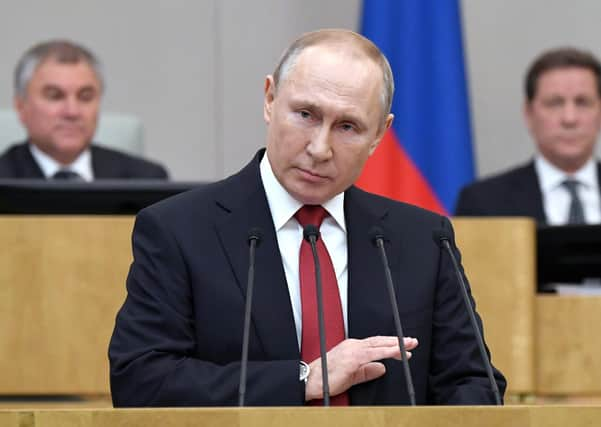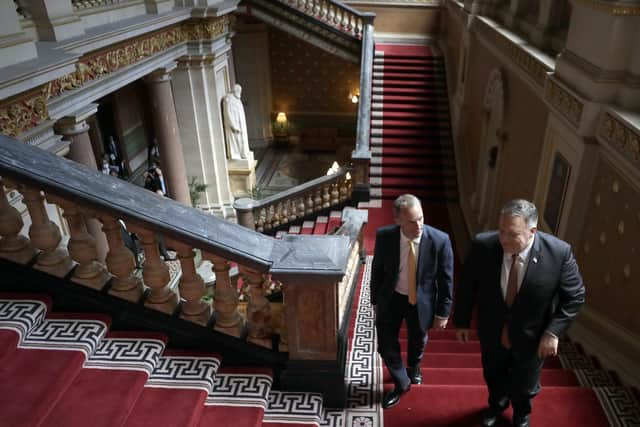UK never investigated Russian interference in Brexit decision


Russian interference in the UK is the “new normal”, with rival oligarchs treating the capital as “Londongrad” - a playground where they can launder dirty money, hire local security companies to dig up “kompromat” on their enemies, and embed themselves among the British political elite.
The ISC warned the UK was “playing catch-up” on the threat from Russia, and called for “immediate action” including legislation to limit the influence of Russian actors.
Advertisement
Hide AdAdvertisement
Hide AdIts report found that intelligence agencies and government departments have treated the issue as a “hot potato”, with an overly-complicated chain of command preventing action.


Downing Street responded to the report by insisting there was “no evidence” of successful Russian interference in the Brexit vote, and ruling out any inquiry.
The heavily redacted report, drawn up under the chairmanship of Dominic Grieve – a former Conservative MP and fierce critic of Boris Johnson – noted “widespread public allegations that Russia sought to influence the 2016 referendum”.
“Open source studies have pointed to the preponderance of pro-Brexit or anti-EU stories on RT and Sputnik, and the use of ‘bots’ and ‘trolls’ as evidence of Russian attempts to influence the process,” the report says. “We have sought to establish whether there is secret intelligence which supported or built on these studies. In response to our request for written evidence at the outset of the inquiry, MI5 initially provided just six lines of text.”
The report states that the lack of investigation was “in stark contrast to the US handling of allegations of Russian interference in the 2016 US presidential election, where an intelligence community assessment was produced within two months of the vote”.
ISC member and SNP MP Stewart Hosie said: “There has been no assessment of Russian interference in the EU referendum and this goes back to nobody wanting to touch the issue with a 10ft pole.”
Labour ISC member Kevan Jones said the Government has to “take responsibility” for failing to look into possible Russian interference. Asked if security services were partly responsible for not investigating, Mr Jones said it was “not fair” to “sidestep” and blame the intelligence agencies.
The report also accuses social media companies of failing to play their part to remove covert “hostile state material”, and calls on the Government to name and shame firms that fail to act. Without naming individuals, the ISC also claims several members of the House of Lords have business interests linked to Russia, or work directly for major firms linked to the Kremlin. These relationships should be carefully scrutinised, given the potential for the Russian state to exploit them, the committee warns.
Advertisement
Hide AdAdvertisement
Hide Ad“A lot of Russians with very close links to Putin who are well integrated into the UK business and social scene, are accepted because of their wealth” the report states.
The committee said the Government “had not seen or sought evidence of successful interference in UK democratic processes” and called for the intelligence community to carry out a full assessment of potential Russian meddling in the 2016 referendum.
But the Government rejected the call, saying “we have seen no evidence of successful interference in the EU referendum”.
The Government also denied the suggestion it had “badly underestimated” the Russian threat.
Foreign Secretary Dominic Raab said: “We’ve been clear that Russia must desist from its attacks on the UK and our allies. We will be resolute in defending our country, our democracy and our values from such hostile state activity.”
In response, Konstantin Kosachev, the head of the foreign affairs committee of Russia’s Federation Council, accused the UK of playing a “leading role in Russophobia”, but also claimed the report “lifted the suspicion on Russia for Brexit”.
Brexit campaigner Nigel Farage said that claims of Russian interference in the EU referendum were “all a hoax – apologies are now required”.
The report had been expected to be published before the 2019 general election, but the ISC has not met in nearly a year because of the government’s failure to convene it.
Advertisement
Hide AdAdvertisement
Hide AdMr Jones said there was “no reason” for the delay in the publication, adding that claims by the Prime Minister it required six weeks to sign off were “categorically not true”.
Julian Lewis, the chairman of the committee who had the Tory whip removed for running against Number 10’s preferred candidate Chris Grayling, said: “This committee has been subject to unprecedented delay and dislocation. This must never happen again. The sooner normal relations are established between this government and the committee, the better for all concerned.”
A message from the Editor:
Thank you for reading this story on our website. While I have your attention, I also have an important request to make of you.
The dramatic events of 2020 are having a major impact on many of our advertisers - and consequently the revenue we receive. We are now more reliant than ever on you taking out a digital subscription to support our journalism.
Subscribe to scotsman.com and enjoy unlimited access to Scottish news and information online and on our app. Visit https://www.scotsman.com/subscriptions now to sign up.
By supporting us, we are able to support you in providing trusted, fact-checked content for this website.
Joy Yates
Editorial Director
Comments
Want to join the conversation? Please or to comment on this article.